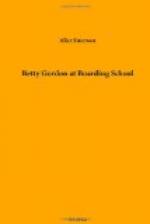“How much is it?” she asked the saleswoman.
“Oh, but six dollars,” answered that young person with a wave of one jeweled hand as though six dollars were a mere nothing.
“I’ll take it,” said Betty decisively. “And I’ll wear it and the hat, too, please; you can wrap up my old one.”
Bob was silent until the transaction had been completed and they were out of the shop.
“You wait here and I’ll see about getting a car to take us along the Drive,” he said then.
“You’re—you’re not mad at me, are you Bob?” faltered Betty, putting an appealing hand on his arm. “I haven’t had any fun with clothes all summer long.”
“No, I’m not mad. But I think you’re an awful chump,” replied Bob with his characteristic frankness.
Before the drive was over, Betty was inclined to agree with him.
The car was an open one, and while the day was warm and sunny, there was a lively breeze blowing straight off the lake. The veil persisted in blowing first into Betty’s eyes, then into Bob’s, and interfered to an amazing degree with their enjoyment of the scenery. Finally, as they rounded a curve and caught the full breath of the breeze, the veil blew away entirely.
“Let it go,” said Betty resignedly. “It’s cost me six dollars to learn I don’t want to wear a veil.”
Bob privately decided he liked her much better without the flimsy net affair, but he wisely determined not to air his opinion. There was no use, he told himself, in “rubbing it in.”
They had lunch in a cozy little tea-room and went back to the train like seasoned travelers. Bob was an ideal companion for such journeys, for he never lost his head and never missed connections, while nervous haste was unknown to him.
“Won’t I be glad to see the Littells!” exclaimed Betty, watching the porter make up their berths.
“So shall I,” agreed Bob. “Did you ever know such hospitable people, asking a whole raft of us to spend the week at Fairfields? How many did Bobby write would be there?”
“Let’s see,” said Betty, checking off on her fingers. “There’ll be Bobby and Louise, of course; and Esther who is too young to go away to school, but who will want to do everything we do; Libbie Littell and another Vermont girl we don’t know—Frances Martin; you and I; and the five boys Mr. Littell wrote you about—the Tucker twins, Timothy Derby, Sydney Cooke and Winifred Marion Brown. Twelve of us! Won’t it be fun! I do wish the Guerin girls could be there, but we’ll see them at the school.”
“I’d like to see that Winifred Marion chap,” declared Bob. “A boy with a girl’s name has his troubles cut out for him, I should say.”
“Lots of ’em have girls’ names—in history,” contributed Betty absently. “What time do we get into Washington, Bob?”
“Around five, probably six p.m., for we’re likely to be a bit late,” replied Bob. “Let’s go to bed now, Betty, and get an early start in the morning.”




